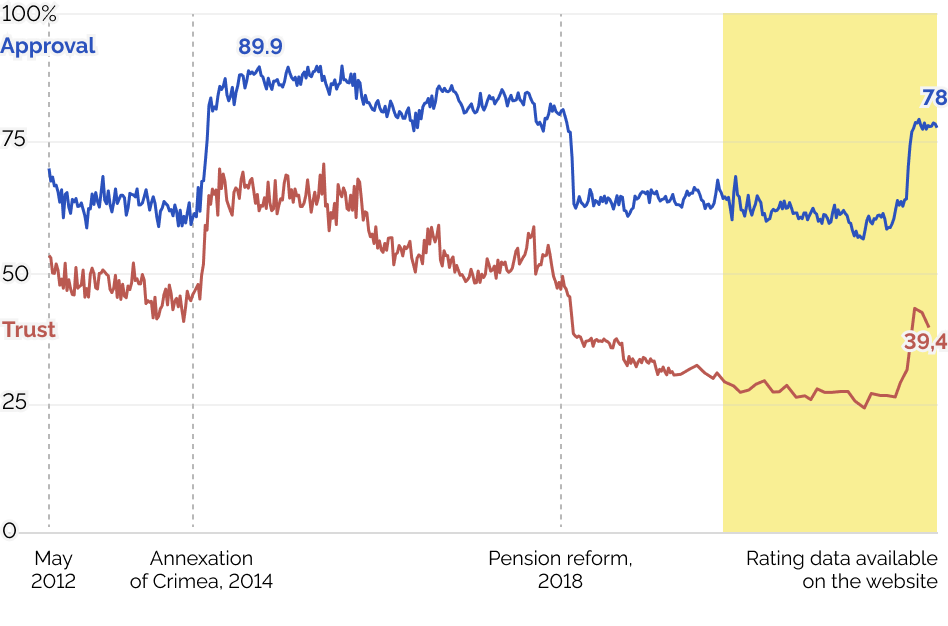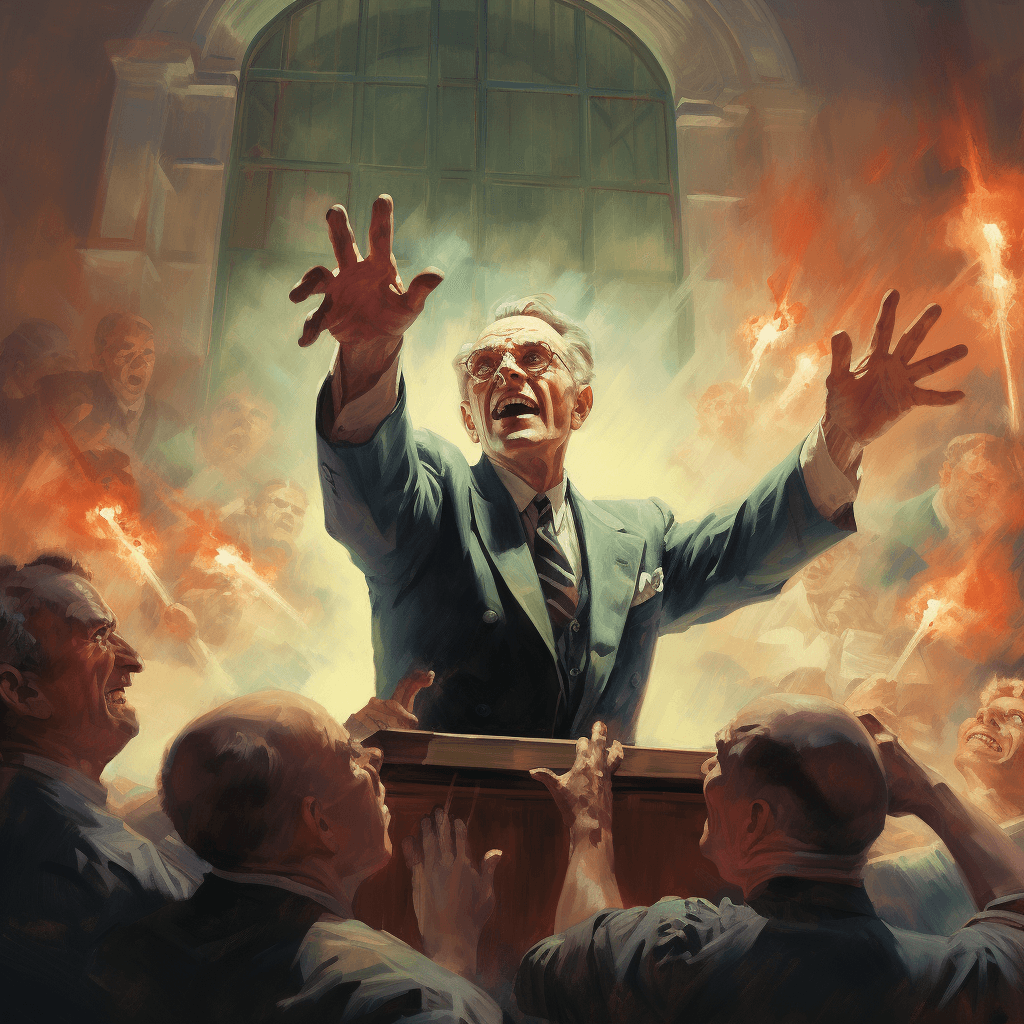How All of Russian TV Became State-Controlled
Short biography of the freedom that never happened.


Since the beginning of the war, many have been interested in the question whether or not most Russians support the military aggression in Ukraine and the government actions in general. Despite the ongoing opinion polls, there may be no simple answer to this question — because of the way social research functions in authoritarian contexts that casts doubt on whether polls published in Russia can be trusted.
Polling in Russia, as well as social and political research organisations in general, have increasingly been under government control in recent decades. Social and political sciences experienced increased political pressure as the more liberal universities, such as the European University in Saint Petersburg and the Moscow School for the Social and Economic Sciences, were denied accreditation; political scientists from Moscow Higher School of Economics and MGIMO and faculty members from the Faculty of Liberal Arts and Sciences of the St. Petersburg State University were fired. Between 2014 and 2016, among others, the Centre for Independent Social Research in Saint Petersburg, the Center for Social Policy and Gender Studies in Saratov, and the Levada Center in Moscow (one of the biggest polling organisations in Russia) were labelled as “foreign agents”, as a result of which the second was closed, and the third lost the ability to publish its results in all major Russian media — not to mention the fact that this status made research itself difficult. This means that today’s polling and social research landscape in Russia is dominated by VCIOM (Russian Public Opinion Research Center) and FOM (Public Opinion Foundation), for both of which the government (for FOM specifically — the Presidential Administration) is the main source of funding and the main client.
The organisations controlled by the government can deliver the poll results suited to the client’s needs. This does not necessarily mean outright falsifications (the answers to the same questions obtained by the loyal VCIOM and the “foreign agent” Levada Center do not differ by much). However, what can be manipulated is which topics are addressed or not addressed at all, how the questions are framed, which options are given to the responders, and which results are published. Changing just one of these parameters can completely alter the poll’s results. For example, in 2019, VCIOM’s rating of President Putin (based on an open-ended question) had fallen to 30,5%. To remedy the situation, VCIOM changed the question wording, making it a closed question, which brought Putin’s rating back to 72,3%. Another example — VCIOM regularly asks respondents questions about Navalny but almost never publishes the results.

Actual approval rating. Source: proekt.media
When it comes to surveys related to the war, the pollsters use the government-approved framing of it as “special military operation”. It is likely that, if the words “war” or “Russia’s attack on Ukraine” were used, the numbers of its supporters in the poll would be different. In the Russian official media, the overall numbers of support for the “military operation” are cited — but not the fact that, according to the polls, this support is minimal among young people under 30.
In this sense, public opinion polls are used as a tool for propaganda, to create the impression of overwhelming support and legitimise the government’s actions. This effect has been termed the “Spiral of silence” by Elisabeth Noelle-Neumann (a post-WW2 German political scientist): seeing the majority supporting something, the previously undecided join the majority to avoid being outcasts, and those who find themselves in the minority are demotivated to speak up; because of this, next time, the majority is even bigger, and the pressure to join it is even stronger, making even more people express support — and so on. This effect is especially relevant for authoritarian countries.
Even when the surveys are not manipulated, in authoritarian contexts the answers are distorted by the subject of the study — the population itself, due to self-selection of those who decide to participate as opposed to those who refuse. There is a reason to believe that, when simply saying something wrong publicly can lead to 15 years in prison, people (especially those who oppose the official point of view) might not want to answer questions posed by strangers. According to a 2020 survey by Levada Center, in Russia supporters of the regime more often trust opinion polls than opponents of the regime do (58% vs. 32%), which may lead to overrepresentation of supporters. The Russian Field researcher group and Maxim Kats conducted a survey to ask people what they think about war, and 29,400 people out of 31,000 refused to speak to the interviewers.
Of those who agree to the interview, not all may give their true opinion. They may exaggerate their support out of fear of persecution or out of the wish to be with the majority and give a socially desirable answer (the social desirability bias can be present in all societies but mass preference falsification is very characteristic for authoritarian regimes). Sociologists Chapkovski and Schaub in their study show more than 10% of Russians that are afraid to speak frankly about the war in a survey. During war times, people may answer under the influence of very strong but fluctuating emotions, and give more radical answers (both in support and opposition) than they otherwise would. Most importantly, in order to have an opinion, one must have an opinion, and a big proportion of people in Russia (as in many authoritarian regimes) are alienated from politics, they believe that nothing depends on them and therefore see little point in forming an opinion, especially under the influence of propaganda that leads them to believe that “we don’t know all the truth” and “everybody lies”. Finally, when people express support, it does not necessarily tell us much about what exactly people are supporting, how they interpret the question posed by the pollster.
One of the main features of authoritarianism is the lack of feedback from society to the political system. Since the people do not have the freedom to express their will, its true opinions remain a black box that may contain something different than what is on the surface. For example, in communist countries, open opposition to the regime was very low until its very fall.
However, it may also be that the high support of the government shown by the pollsters is simply due to the rally ‘round the flag effect when the society consolidates around leaders during war times as they perceive themselves to be surrounded by enemies.
The fact is that we simply do not know what is in the black box, and we do not have a reliable way to find out.
However, it does not mean that polls are completely meaningless. If one knows about their limits, there is still something to be learned — for example, how opinions vary between different age groups. And while we cannot be sure about quantitative results (the numbers of supporters and opposition), studies based on other methods, such as deep interviews and focus groups, do at least give some information about different types of motivation for support or lack thereof. Finally, the surveys that are less obviously political (e.g. about values that underlie the official ideology) may give more accurate results because people are less afraid to respond openly.
Short biography of the freedom that never happened.

In part 1 we've covered the state position to economy. What is the stand of the public?

Conspiracy theories and bogus science: Russia uses this in criminal cases, propaganda and justification of war. What are the most famous cases of this and how does it work?

Our media platform would not exist without an international team of volunteers. Do you want to become one? Here's the list of currently opened positions:
Is there any other way you would like to contribute? Let us know:
We talk about the current problems of Russia and of its people, standing against the war and for democracy. We strive to make our content as accessible as possible to the European audience.
Do you want to cooperate on content made by the Russian standing against the war?
We want to make people of Russia, who stand for peace and democracy, heard. We publish their stories and interview them in Ask a Russian project.
Are you a person of Russia or know someone who would like to share their story? Please contact us. Your experience will help people understand how Russia works.
We can publish your experience anonymously.
Our project is ran by international volunteers - not a single member of the team is paid in any way. The project, however, has running costs: hosting, domains, subscription to paid online services (such as Midjourney or Fillout.com) and advertising.
Our transparent bank account is 2702660360/2010, registered at Fio Banka (Czech republic). You can either send us money directly, or scan one of the QR codes bellow in your banking app:




Note: The QR codes work only when you scan them directly from your banking app.
Russia started the war against Ukraine. This war is happening from 2014. It has only intensified on February 24th 2022. Milions of Ukrainians are suffering. The perpetrators of this must be brought to justice for their crimes.
Russian regime tries to silence its liberal voices. Russian people against the war exist - and the Russian regime tries its best to silence them. We want to prevent that and make their voices heard.
Connection is crucial. The Russian liberal initiatives are hard to read for European public at times. The legal, social and historical context of Russia is not always clear. We want to share information, build bridges and connect the liberal Russia with The West.
We believe in dialogue, not isolation. The oppositional powers in Russia will not be able to change anything without the support of the democratic world. We also believe that the dialogue should go both ways.
The choice is yours. We understand the anger for the Russian crimes. It is up to you whether you want to listen to the Russian people standing against this.